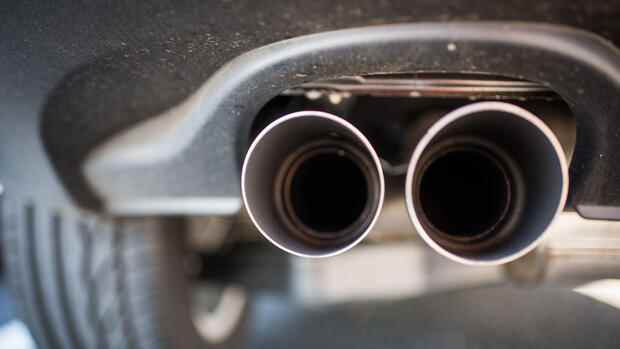The EU Commission wants to further reduce pollutant emissions from cars and commercial vehicles.
(Photo: dpa)
Brussels A new emission standard “Euro 7” and several additions should help to reduce the concentration of fine dust in Europe’s cities. This emerges from a draft for a legislative proposal that is available to the Handelsblatt. The EU Commission wants to publish it on November 9th.
Accordingly, not only a new, more stringent emission class – called Euro 7 – should be created. One innovation is that the lifespan of the batteries in electric cars should also be checked. Cars and commercial vehicles with inferior batteries would therefore not be allowed to carry the Euro 7 label.
Additional classes are also planned:
- Euro 7+ for cars that emit at least ten percent less pollutants than the Euro 7 standard specifies, or whose battery life is at least ten percent longer than specified.
- Euro 7A for cars whose emission control system can be adapted so that emissions can be further reduced in environmental zones.
- Euro 7G for hybrid cars with location determination, which automatically switch to zero-emissions electric mode in environmental zones.
Top jobs of the day
Find the best jobs now and
be notified by email.
The car manufacturers should be allowed to combine these awards. The labels “Euro 7+A”, “Euro 7+G”, “Euro 7+AG” and “Euro 7AG” would therefore be possible.
From 2035: No approval for combustion engines
The fact that a new emission standard is to be introduced at all is also met with criticism in Brussels. After all, the end of combustion engines is as good as sealed.
The new EU standard will then decide which cars are still allowed to drive in inner cities.
(Photo: imago images/Future Image)
From 2035, cars that emit CO2 will no longer be allowed to be registered. This is not regulated by the emission standard, but by fleet consumption. The emission standards will then become obsolete for new cars.
They only remain important for the question of which cars registered before 2035 will still be allowed to drive into city centers.
The CSU MEP Markus Ferber considers the proposal for a new standard to be absurd. “The more stringent emission standards make the phased-out model a costly investment in its grace period,” he said.
>> Read here: Coalition agrees on a common position on the combustion engine off
“The timing could hardly be more inappropriate: the world is on fire, inflation is causing prices to skyrocket, companies and citizens are groaning under soaring energy prices and the Commission is proposing new emission standards.” That leaves the prices for cars and above all Trucks and buses skyrocket.
High pressure on the auto industry
The EU Commission promises not to make the requirements too restrictive. “In the light of the current political and economic circumstances” she has revised her proposal again, according to the recitals for the law.
Because the costs of energy and raw materials have risen dramatically, while the demand for cars has fallen. The pressure on the auto industry is unprecedented.
>> Read here: Attacking the kilos – Why electric cars just aren’t getting any lighter
It remains to be seen how these considerations will affect the specified emission values. This is to be regulated in the appendix to the law. However, no numbers have been entered in the draft so far.
For the proposal to become law, the approval of the European Parliament and the Council of Member States is required. As soon as the Commission has presented its ideas, the consultations can begin there.
More: VW – New emission standard Euro 7 makes small cars significantly more expensive
